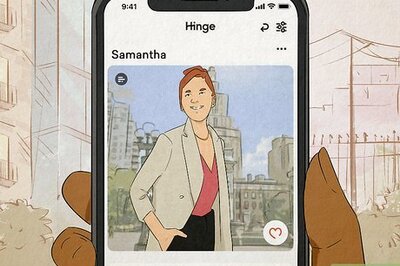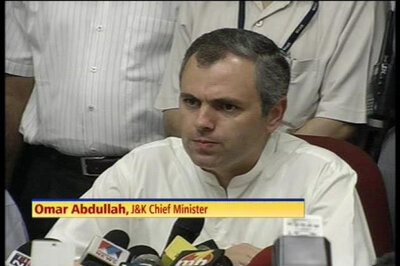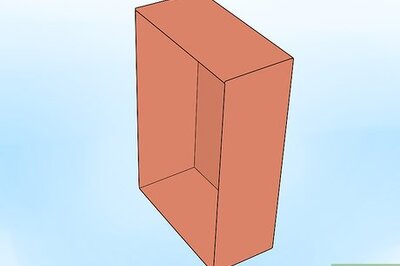
views
Filmmaker Mahesh Bhatt feels it is not easy to pen the experiences of life especially when it comes to writing about loved ones who are no more. Bhatt's relationship with yesteryear’s glam girl Parveen Babi has been extensively written about but none have been able to convey the feeling of loss that he has always felt, before and after her death.
His upcoming film Woh Lamhe, featuring Kangana and Shiney Ahuja, is Bhatt's "final goodbye to Parveen Babi". This article written by Bhatt delineates the pain and the hopelessness he felt as he watched Parveen slip into oblivion.
In Parveen's Memory
I was watching the last scene of Woh Lamhe in my editing room when it dawned on me — I know why human beings have always tried to keep their dead alive: We try to keep them alive in order to keep them with us.
When my mother died, I had to descend into her grave to turn her face towards the sacred Kaba. So overwhelmed was I at the thought of leaving her in that cold grave that I was seized by this overpowering longing to stay there with her ‘forever’.
It was there, in that moment of finality, that I learned that if we are to live ourselves, there comes a point at which we must let go of the dead, let them go, keep them dead. Let their bodies disintegrate into dust and fuel the never-ending flow of life. Let them become a picture by our bedside. Let them become a melody which people can hum, and let their lives and their dreams flicker on movie screens and fill the living with some hope.
Woh Lamhe is my last goodbye to the memories of Parveen Babi, a woman whom I loved and lost.
The streets of Mumbai for me are littered with memories of half-lived yesterdays. The day Parveen died, I realised that in spite of my claims that I had made to myself, her memory had not withered within me with the passage of time.
Praveen’s breakdown is an old story. But I wonder if anyone can imagine what it is like to live with a person who is going mad.
The morning I left Parveen’s house before it all began, comes back to haunt me. She was off to her shoot for Prakash Mehra, and I was off to fill up my long empty days with talk of cinema, with my struggling out-of-work contemporaries in Mehboob Studios.
In retrospect, I remember that there was a strange feeling of dread in the air. She kissed me goodbye making sure that the kiss would not spoil her makeup. Little did I know that that was the last time I would see her as the Parveen that I knew.
PAGE_BREAK
How can I ever forget that heartbreaking image of her, when I walked in to the house that evening, and found Parveen, in make up and a filmy song costume, cowering in a corner of the room, with a knife in her hand, shivering with fear? She looked like an animal, one that I had never seen before. ‘Close the door Mahesh,’ she whispered. ‘They are coming to kill us. Close the door quickly!’
And with those words, ended my days of love and splendor, sin and passion with Parveen. I was looking into the eyes of madness and the face of death. Because, the person that I knew had died, and with that our relationship as we had known it, died too.
Parveen started to break into little pieces in front of my eyes, and I was helpless in the face of the fury of her madness. And all the kings’ horses and all the kings’ men could not put her together again.
Parveen’s illness was genetic. The chances of her recovery were slim to none. The doctors who treated her knew this but were not decorous enough to tell us this bitter truth, because if they did they would be out of business.
It was in those terrible times that I discovered for myself that it is we who push the so called ‘mentally disturbed’ to commit suicide. That is the reason why I have no hesitation in saying that the psychiatrist is one of the worst enemies of our culture. Because it is he who is forcing all those people who have thrown in the towel to fit into this brutal value system.
Parveen’s madness, the threat from the mighties of the film industry to put her before the camera at any cost, the psychiatrists throwing up their hands, and her ‘ignorant’ mother yielding to the pressure for electric shock treatment, climaxing with me running away with her to the jungles of Kodai where we spent the ‘best’ moments of our life is ‘fictionalised’ brilliantly by Mohit Suri and Shagufta Rafique in the second half of Woh Lamhe.
Our attempt in this film is not just to make you grieve or uplift the viewer, but to leave an indelible memory of the essence and truth of an exceptional woman who lived in another time and place.
‘Why are you using the tragedy of Parveen Babi and marketing it for profit?’ asked a self-righteous priest to me recently. I answered with a smile, ‘I must say I’m staggered by your unblinking arrogance. Don’t you see the absurdity of all you people asking me this question? You and those before you have only made the suffering of a man called Jesus into a multi-billion dollar industry today! And will continue to do so...
I am at least marketing the memories of a friend, which are mine and mine alone. Are you going to claim copyright over those memories too now? In that case you should be crossing swords with every media person. After all, the marketing of tragedy is something the media does every day!’ The priest froze, not having expected this kind of outburst.
PAGE_BREAK
The power of grief deranges the human mind. Writing and making movies is my way of dealing with my life burns. Who Lamhe has erupted from the deepest part of my being. And that part of me was triggered suddenly one day by Parveen’s death and the subsequent discovery of a tape, which my daughter Pooja found in my first wife’s house and brought over to me.
The tape contained a letter that Parveen had recorded and sent me, in which she talked about her approaching illness, her overpowering loneliness and her need to get out of the entertainment business. The silences between her words spoke to me more eloquently than her words did. I remember these silences as being a defining part of our relationship. The only regret I have is that I couldn’t see her illness coming.
Looking back, I realise now that there were so many signs that I just failed to read.
On a silent moonlit night long before Parveen’s actual breakdown, I woke up in her house to the sounds of someone whining. I discovered that the side of the bed on which she slept was empty. Her zebra-striped bed quilt without which she never slept was gone.
When I rushed out of the bedroom I found Parveen seated under a lamp made out of shells, weeping inconsolably. Worried, I inched closer to her to find out what had triggered this sudden upsurge of emotions. I remember that she recoiled from me and covered herself with her quilt.
At dawn, when darkness began to recede from her drawing room and the air started to resonate with the chants of Hare Rama, Hare Krishna from the adjoining ISKON centre, in a heartbeat, her mood changed.
Suddenly, she went into the bathroom and having bathed, dressed herself in immaculate white kurta pyjama. Rolling a small mat onto the red carpet, she did something I had never seen her do in my three and a half years association with her. She began her namaaz.
The sight was mesmerizing. Her silhouette against the glow of the morning sky, her trembling lips reciting the Arabic prayers, her tears of grief metamorphosing into fervent tears of devotion, still play on the screen of my memory. Then, having concluded her prayer, she began to lay the table and light the candles, even as a beam of sunlight fell upon her, after which she went into the kitchen and immersed herself in the domestic activity of preparing breakfast for herself and me. Parveen loved the domestic chores from which ordinary women seek respite.
PAGE_BREAK
As the day deepened, our silence was punctuated by the occasional flicker of a smile which would play on her lips, and just as suddenly, tears would start to brim in her eyes. I did not know what had happened to her in the night that made her do what she did, or what was going on in her mind now. As she sat down staring at her palm, and puffing on a cigarette, she finally spoke to me.
“If you shut this window and save me from this deafening roar of the ocean, I’ll tell you what happened to me last night,” she said. And then she opened the doors to a traumatic incident in her life, which she had kept shut from the world for a very long time.
She spoke about the riots in Ahemdabad. If my memory doesn’t fail me, I think it was the carnage of 1969 that she was referring to, where 4,000 people are rumored to have died, most of them Muslims. Tales of Muslim girls being raped and killed were flying thick and fast around the city, and the nuns in her school, fearing for Parveen’s life and safety, hid her under a pile of thick mattresses, in a truck, and smuggled her out of the campus to a safe zone.
“You do not know,” she said in a matter of fact tone that itself sent a shiver down my spine, what it is to lie curled up under a pile of mattresses, knowing and fearing that any moment, the mob could stop the vehicle that I was in, and pull me out and rape me and tear me to shreds.
What still stays with me is the manner in which she said what she said. My wife today wonders whether it was this trauma, which scarred her psyche and contributed to her breakdown. Frankly, if you ask me, I don’t know.
When I first started to write and make movies, I felt that everything could be explained. Now that I have grown older, I can see how untrue it would be, if I claim that I have been able to tell you the story of my life with Parveen Babi. Not knowing is not resignation. It is an opening to amazement.
Life does not end. But films do, and with them the lives and thoughts and dreams we have shared for so short and magical a time. We leave the characters of a movie at the zenith of their lives or in the hours of their deaths, and there they remain frozen in time.
In a village somewhere in Africa, when a storyteller comes to the end of his tale, he places the palm of his hand on the ground and says, "I put down my story here." Then he adds, "So that someone else may take it up another day."
Mahesh Bhatt




















Comments
0 comment